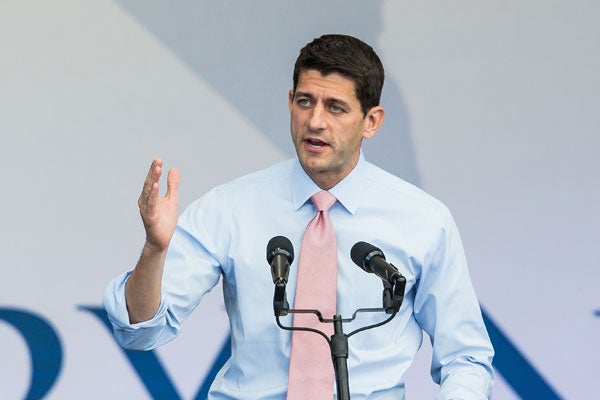House Budget Committee Chairman Paul Ryan’s (R–Wis.) steps to reduce the budget would help boost economic growth.
Ryan’s 2015 budget proposal contains more than $5 trillion in savings over 10 years and balances by the end of the budget window, leaving a $5 billion surplus in 2024. Ryan’s budget acquires much of these savings by reforming welfare and entitlements—the largest drivers of debt and, from a political standpoint, perhaps the most difficult to modify.
As expected, Democrats quickly decried Ryan’s budget as a “stinkburger,” claiming that it would tank the economy. But, much like Ryan’s plan for a premium support system that garnered unfounded opposition from the Left, the CBO (no bastion of conservative thought) issued a report that refutes this criticism. The CBO notes that instead of causing great detriment to the economy, the Ryan budget plan for aggressive debt reduction would have a positive net effect on economic output:
Over time, lower federal debt leaves more funds available for private investment and thereby causes output to be higher than it would be otherwise. Higher federal debt has the opposite effect, “crowding out” private investment and decreasing output.
Furthermore, the CBO states that there will be positive gains from other effects of the proposal—including some that are not reflected in economic output:
[Ryan’s budget path] would affect economic output not only by reducing debt but also by altering incentives to work and save and by changing behavior in other ways. In addition, those policies would affect people’s well-being in various ways beyond the effects on overall economic output.
The CBO’s assessment of Ryan’s budget confirms that pursuing debt reduction would, in fact, be a boon to the economy—a position that Heritage has long advocated. Indeed, the CBO report largely echoes Grover M. Hermann Fellow Romina Boccia’s brief on the benefits of debt reduction that was released during the budget talks of 2013. As Boccia wrote:
Deficit spending shifts economic resources from the future to the present, leaving younger generations with a larger tax burden and fewer resources to invest. In reverse, lower government spending frees economic resources for investment in the private sector, which improves consumer wealth. In sum, additional government spending today harms economic growth in the long term, while budget cuts today would enable the economy to grow much faster tomorrow.
With the CBO reasserting these benefits of debt reduction, it will be important to emphasize the necessity of downsizing the federal budget while lawmakers debate federal funding levels for the FY 2015 budget. Congress faces a choice: it can cut down on reckless spending in Washington and grow the national economy, or it can continue spending unsustainable amounts, saddling future generations with today’s debts and a sluggish economy.






























